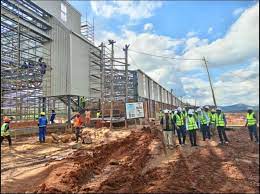The government is fast-tracking the construction of Rwanda’s Biggest Tea Factory in Nyaruguru district. In 2017, Unilever, a British company, started the scheme of tea cultivation and tea factory construction in Nyaruguru. The scheme was to be accomplished with a partnership of Sir Ian Wood and now the process is nearing completion.
At the beginning, Unilever Tea Rwanda signed an agreement with the Government of Rwanda in May 2016. The agreement was to spend over $30 million over four years in developing two large scale tea sites. Importantly, the sites were to be located in Kibeho and Munini as well as a processing factory.
Also Read: Rwanda to construct US $38m powdered milk factory
Tea farming venture in the wake of construction of Rwanda’s Biggest Tea Factory in Nyaruguru
So far, the planted tea has grown and now the construction of Kibeho tea factory is at good progress. According to Félix Mutai, who is in charge of constructing this Factory, the construction work was initiated in 2022. Moreover, he hopes to complete their work by the end of 2023. “This factory will have three tea processing lines, and will have the capacity of processing 150 tons of tea leaves per day,” he said.
Through its processing capacity, it is intended that this factory will supply ten thousands of tons to the international market. It is also planned that between 30% and 40% of tea will be harvested in the Factory’s farms. Additionally, between 60% and 70% will be picked from tea growers’ farms. Importantly, tea growers are increasing their cultivation area under the help of the SCON project.
Additionally, the factory will also employ 200 workers, who will be increased as the factory expands. Sir Ian Wood visited the ongoing construction of this factory and requested that Rwandans strive to take care of tea properly. This will enable tea to become more popular on the international market.
